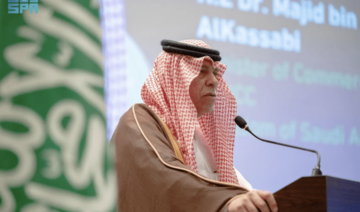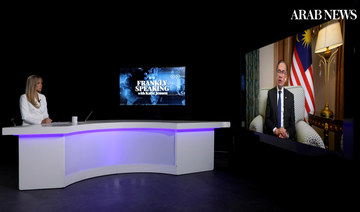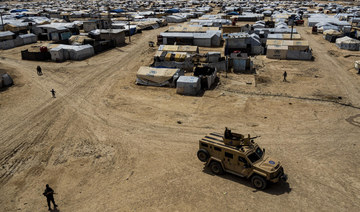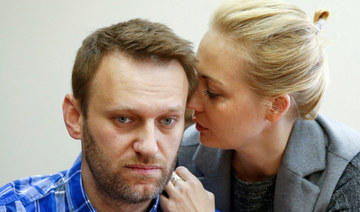SYDNEY: Australian police charged a top Vatican cardinal on Thursday with multiple counts of historical sexual assault offenses, a stunning decision certain to rock the highest levels of the Holy See.
Cardinal George Pell, Pope Francis’ chief financial adviser and Australia’s most senior Catholic, is the highest-ranking Vatican official to ever be charged in the church’s long-running sexual abuse scandal. Pell said he would return to Australia to fight the charges.
Victoria state Police Deputy Commissioner Shane Patton said police have summonsed Pell to appear in an Australian court to face multiple charges of “historical sexual assault offenses,” meaning offenses that generally occurred some time ago. Patton said there are multiple complainants against Pell, but gave no other details on the allegations against the cardinal. Pell was ordered to appear in Melbourne Magistrates Court on July 18.
The Catholic Archdiocese of Sydney issued a statement on behalf of Pell, saying the 76-year-old cardinal “strenuously denied all allegations” and would return to Australia to clear his name.
“He said he is looking forward to his day in court and will defend the charges vigorously,” the statement said.
Patton told reporters in Melbourne that none of the allegations against Pell had been tested in any court, adding: “Cardinal Pell, like any other defendant, has a right to due process.”
The charges are a new and serious blow to Pope Francis, who has already suffered several credibility setbacks in his promised “zero tolerance” policy about sex abuse.
For years, Pell has faced allegations that he mishandled cases of clergy abuse when he was archbishop of Melbourne and, later, Sydney. His actions as archbishop came under intense scrutiny in recent years by a government-authorized investigation into how the Catholic Church and other institutions have responded to the sexual abuse of children. Australia’s Royal Commission into Institutional Responses to Child Sexual Abuse — the nation’s highest form of inquiry — has found shocking levels of abuse in Australia’s Catholic Church, revealing earlier this year that 7 percent of Catholic priests were accused of sexually abusing children over the past several decades.
Last year, Pell acknowledged during his testimony to the commission that the Catholic Church had made “enormous mistakes” in allowing thousands of children to be raped and molested by priests over centuries. He conceded that he, too, had erred by often believing the priests over victims who alleged abuse. And he vowed to help end a rash of suicides that has plagued church abuse victims in his Australian hometown of Ballarat.
But more recently, Pell himself became the focus of a clergy sex abuse investigation, with Victoria detectives flying to the Vatican last year to interview the cardinal. It is unclear what allegations the charges announced Thursday relate to, but two men, now in their 40s, have said that Pell touched them inappropriately at a swimming pool in the late 1970s, when Pell was a senior priest in Melbourne.
Australia has no extradition treaty with the Vatican. But in the statement from the Sydney Archdiocese, Pell said he would return to Australia “as soon as possible,” following advice and approval by his doctors. Last year, Pell declined to return to Australia to testify for the third time before the Royal Commission, saying he was too ill to fly. He instead testified via video conference from Rome.
The charges put Pope Francis in a thorny position. In 2014, Francis won cautious praise from victims’ advocacy groups when he created a commission of outside experts to advise him and the broader church about “best practices” to fight abuse and protect children.
But the commission has since lost much of its credibility after its two members who were survivors of abuse left. Francis also scrapped the commission’s signature proposal — a tribunal section to hear cases of bishops who covered up for abuse — after Vatican officials objected.
In addition, Francis drew heated criticism for his 2015 appointment of a Chilean bishop accused by victims of helping cover up for Chile’s most notorious pedophile. The pope was later caught on videotape labeling the parishioners who opposed the nomination of being “leftists” and “stupid.”
When Francis was asked last year about the accusations against Pell, he said he wanted to wait for Australian justice to take its course before judging. “It’s true, there is a doubt,” he told reporters en route home from Poland. “We have to wait for justice and not first make a mediatic judgment — a judgment of gossip — because that won’t help.”
“Once justice has spoken, I will speak,” he said.
Francis appointed Pell in 2014 to a five-year term to head the Vatican’s new economy secretariat, giving him broad rein to control all economic, administrative, personnel and procurement functions of the Holy See. The mandate has since been restricted to performing more of an oversight role.
It remains to be seen how the pope will respond to the developments.
Given Francis’ credibility is on the line, any decision to keep Pell on as prefect while facing charges would reflect poorly on Francis, given he remains one of the pope’s top advisers.
At the same time, the Vatican has a history of shielding its own: When Cardinal Bernard Law resigned in disgrace in 2002 over his cover-up of abuse in Boston, victims expressed outrage that St. John Paul II gave him a plum position as archpriest of a Rome basilica.
The transfer spared Law what would likely have been years of litigation and testimony in US courts as victims sued the archdioceses for their abuse, though Law himself was never criminally charged with wrongdoing.
In the 1980s, the Vatican refused to cooperate with Italian investigators when one of its officials, Archbishop Paul C. Marcinkus, was indicted over a banking scandal. The Vatican successfully cited his diplomatic immunity.
___
Associated Press writer Nicole Winfield in Rome contributed to this report.
Australian police charge Vatican cardinal with sex offenses
Australian police charge Vatican cardinal with sex offenses
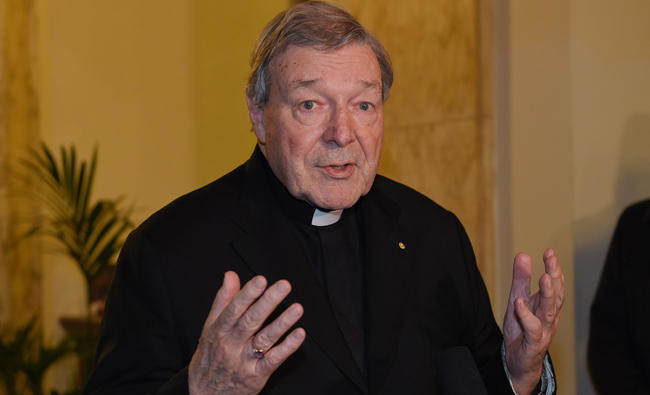
2,000 religious leaders attend Muslim World League conference in Kuala Lumpur
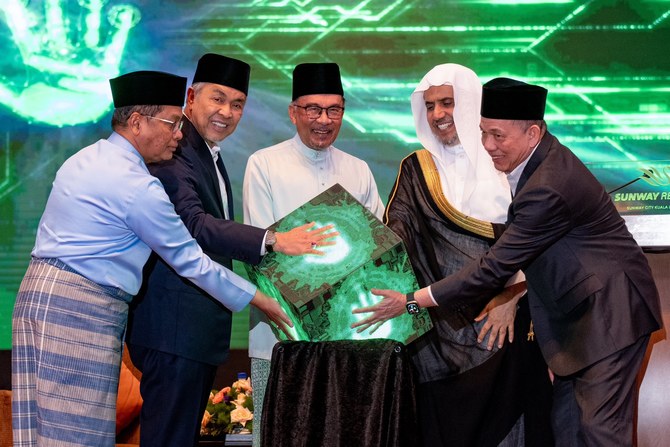
- MWL co-organized international gathering with the Malaysian government
- Prime Minister Anwar Ibrahim delivers speech during the conference
KUALA LUMPUR: More than 2,000 religious leaders and scholars from 57 countries gathered in Kuala Lumpur on Tuesday for a conference organized by the Muslim World League to discuss the role of religion in facilitating dialogue and peace initiatives.
The MWL, an international non-governmental Islamic organization founded in Saudi Arabia in 1962, organized the 2024 International Conference of Religious Leaders with Malaysia’s Department of Islamic Development.
The conference was inaugurated by Malaysian Prime Minister Anwar Ibrahim and MWL Secretary-General Sheikh Dr. Mohammad bin Abdulkarim Al-Issa.
“This religious conference will be an annual feature in Malaysia since it has proved successful in building an understanding and affinity among religions in the world, as well as in Malaysia,” Anwar said during his speech.
“In a conference like this, we can observe the things that need to be done and need to be improved among Muslims, Christians, Buddhists or Hindus. We want to listen to your advice, criticisms and suggestions.”
While about two-thirds of Malaysia’s more than 33 million population are Muslims, there are also large Buddhist, Hindu, and Christian minorities in the country.
“Religious leaders should take an active, effective and courageous role in promoting peace and justice. It is the duty of religious leaders to ensure that governance is guided by strong moral and ethical values,” Anwar said.
Al-Issa said the conference seeks to have a tangible impact.
“This international conference was attended by international, religious, political, intellectual, academic and media leaders. It is considered the first nucleus of a major breakthrough through a number of initiatives and programs around the world, aiming to enhance friendship and cooperation between nations and peoples,” he said.
“Our world is most in need of true solidarity, solidarity with a tangible impact, and is most in need of awareness of the threats threatening its global peace and the harmony of its diverse national communities in their religions and races.”
US repatriates two dozen Westerners from Syria Daesh camp
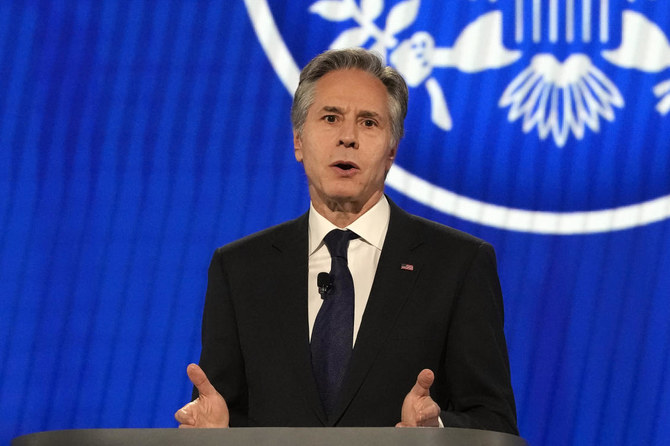
- In a complex operation involving US agencies, Kuwait and pro-US Kurdish fighters, the United States repatriated 11 US citizens
- The US also facilitated the repatriation of six Canadian citizens, four Dutch citizens, and one Finnish citizen
WASHINGTON: The United States announced Tuesday it had brought back two dozen Western citizens, half of them Americans, from a camp for Daesh prisoners in Syria, its largest-ever repatriation as thousands languish.
In a complex operation involving US agencies, Kuwait and pro-US Kurdish fighters, the United States repatriated 11 US citizens, including five minors, as well as a nine-year-old non-US sibling of an American, Secretary of State Antony Blinken said.
The United States in the same operation facilitated the repatriation of six Canadian citizens, four Dutch citizens, and one Finnish citizen, among them eight children, he said.
“This is the largest single repatriation of US citizens from northeast Syria to date,” Blinken said in a statement.
“The only durable solution to the humanitarian and security crisis in the displaced persons camps and detention facilities in northeast Syria is for countries to repatriate, rehabilitate, reintegrate and, where appropriate, ensure accountability for wrongdoing,” he said.
The United States has long pushed European governments to bring back nationals who went to fight for the Daesh group — or their children.
Most European countries have done so but slowly and despite initial reservations, especially in countries with a history of jihadist attacks at home such as France and Britain.
Blinken did not identify the people who were repatriated.
The New York Times, quoting unidentified sources, said they included an American woman, whose Turkish husband apparently took the family to Daesh territory and was later killed, and their nine children.
The Star Tribune of Minneapolis reported last week that a man who joined Daesh but then became a valuable informant was seeking the repatriation of two sons, one apparently the non-US citizen, to be raised by their grandparents in Minnesota.
The repatriations remain controversial in the United States as well, with the administration of former president Donald Trump in one prominent case insisting that a young woman seeking to return was not legitimately a US citizen.
The Kurdish-led Syrian Democratic Forces (SDF) helped US forces crush the Daesh group.
Five years after the extremists were ousted from their last territory, the SDF still holds more than 56,000 detainees with alleged or perceived links to the Daesh group.
Kurdish authorities have been asking foreign governments to repatriate their nationals but Western governments have responded slowly for fear of domestic backlash.
Putin starts new six-year term with challenge to the West
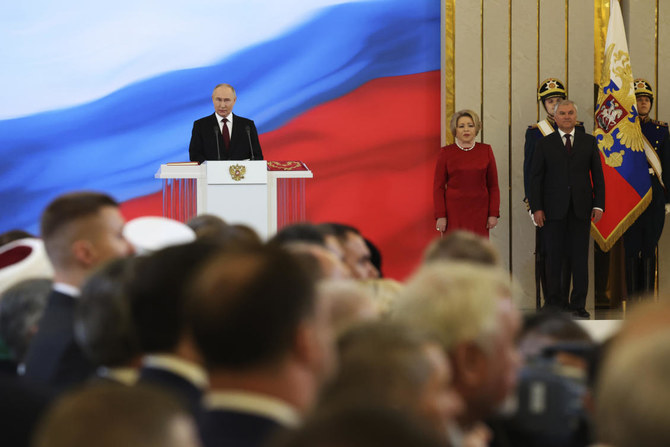
- Putin is sworn in for fifth term
- US and many EU states stay away
- Putin says he’s not ending dialogue with West
MOSCOW: Russian President Vladimir Putin said it was up the West to choose between confrontation and cooperation as he was sworn in for a new six-year term on Tuesday at a Kremlin ceremony that was boycotted by the United States and many of its allies.
More than two years into the war in Ukraine, Putin said he wanted to “bow” before Russia’s soldiers there and declared in his inauguration speech that his landslide re-election in March was proof the country was united and on the right track.
“You, citizens of Russia, have confirmed the correctness of the country’s course. This is of great importance right now, when we are faced with serious challenges,” he told dignitaries in a gilded Kremlin hall where a trumpet fanfare sounded to greet his arrival.
“I see in this a deep understanding of our common historical goals, a determination to adamantly defend our choice, our values, freedom and the national interests of Russia.”
At 71, Putin dominates the domestic political landscape. Leading opposition figures are in prison or exile, and his best known critic, Alexei Navalny, died suddenly in an Arctic penal colony in February.
Yulia Navalnaya, the late dissident’s wife, urged supporters in a video on Tuesday to keep up the struggle against Putin. “With each of his terms, everything only gets worse, and its’ frightening to imagine what else will happen while Putin remains in power,” she said.
On the international stage, Putin is locked in a confrontation with Western countries he accuses of using Ukraine as a vehicle to try to defeat and dismember Russia.
Putin told Russia’s political elite after being sworn in that he was not rejecting dialogue with the West, including on nuclear weapons.
“The choice is theirs: do they intend to continue trying to restrain the development of Russia, continue the policy of aggression, incessant pressure on our country for years, or look for a path to cooperation and peace?” he said.
With Russia’s troops advancing gradually in eastern Ukraine, the top US intelligence official said last week that Putin appeared to see domestic and international developments trending in his favor and the conflict was unlikely to end anytime soon.
It remains unclear how far Putin will seek to press the war and on what terms he might discuss ending it — decisions that will depend in part on whether Joe Biden or Donald Trump wins the US presidential election in November. Ukraine says peace can only come with a full withdrawal of Russia’s troops, who control nearly 20 percent of its territory.
Western absentees
Putin, in power as president or prime minister since 1999, will surpass Soviet leader Josef Stalin and become Russia’s longest-serving ruler since 18th century Empress Catherine the Great if he completes a new six-year term. He would then be eligible to seek re-election again.
He won victory by a record margin in a tightly controlled election from which two anti-war candidates were barred on technical grounds. The opposition called it a sham.
The United States, which said it did not consider his re-election free and fair, stayed away from Tuesday’s ceremony.
Britain, Canada and most EU nations also decided to boycott the swearing-in, but France said it would send its ambassador.
Ukraine said the event sought to create “the illusion of legality for the nearly lifelong stay in power of a person who has turned the Russian Federation into an aggressor state and the ruling regime into a dictatorship.”
Sergei Chemezov, a Putin ally, told Reuters before the ceremony, that Putin brought stability, something which even his critics should welcome.
“For Russia, this is the continuation of our path, this is stability – you can ask any citizen on the street,” he said.
Nuclear tensions
Russia’s relations with the United States and its allies are at their lowest point since the Cuban Missile Crisis of 1962, when the world came to the brink of nuclear war.
The West has provided Ukraine with artillery, tanks and long-range missiles, but NATO troops have not joined the conflict directly, something that both Putin and Biden have warned could lead to World War Three.
Underscoring the rise in nuclear tensions, Russia said on Monday it would practice the deployment of tactical nuclear weapons as part of a military exercise, after what it said were threats from France, Britain and the United States.
One of the decisions awaiting Putin in his new term will be whether to seek to renew or replace the last remaining treaty that limits Russian and US strategic nuclear warheads. The New START agreement is due to expire in 2026.
In line with the constitution, the government resigned at the start of the new presidential term. Putin ordered it to remain in office while he appoints a new one which is expected to include many of the same faces.
Modi, Gandhi urge more Indians to vote as election reaches halfway mark
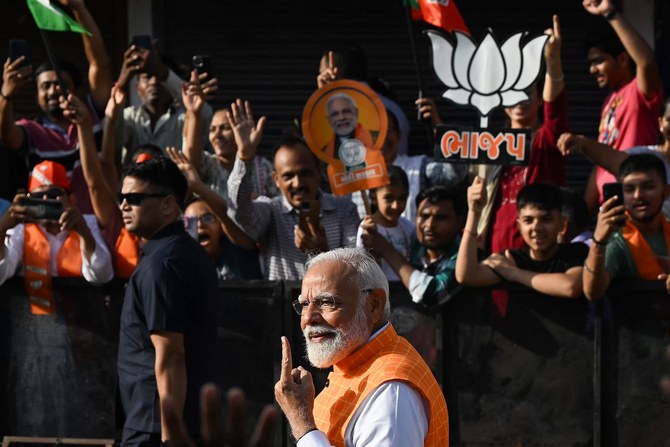
- Voter turnout in the first 2 phases of election was lower than in 2019
- With phase 3 complete, half of voters should have already cast ballots
New Delhi: Prime Minister Narendra Modi and his chief opponent Rahul Gandhi called on voters to cast their ballots on Tuesday, as India’s massive general election reached its halfway mark with a turnout lower than expected.
More than 968 million people have been registered to vote and the polls are held in seven phases from April 19 until June 1. Some of India’s 28 states and eight federally governed territories complete the process on a single day, while others spread it out.
The first two phases of the election were held on April 19 and April 26 in 190 constituencies, with a voter turnout of 66.1 percent and 66.7 percent respectively — about 4 percent lower than in 2019.
In the third phase on Tuesday, citizens from 94 constituencies in 12 states went to the polls, including in Modi’s home state of Gujarat.
“Urging all those who are voting in today’s phase to vote in record numbers. Their active participation will certainly make the elections more vibrant,” the incumbent prime minister said on X after casting his ballot.
Modi is eyeing a rare third straight five-year term in power, targeting 400 seats for the National Democratic Alliance led by his Hindu nationalist Bharatiya Janata Party, which has been in power since 2014.
He is challenged by an alliance of two dozen opposition parties — the Indian National Developmental Inclusive Alliance, or INDIA, led by the Congress Party, which has ruled the country for close to 45 years since its independence in 1947.
Gandhi, Modi’s key contender and Congress leader, is the son of Rajiv Gandhi, a grandson of Indira Gandhi, and a great-grandson of Jawaharlal Nehru — all of whom had served as prime ministers of India.
Congress plunged to a historic low when it was swept out of power by the BJP in the 2014 election, and won its second-lowest number of 52 seats in 2019.
As the turnout showed a declining trend in the first and second phases of the ongoing poll, Gandhi also took to social media to ask voters to show up.
“I request all of you to come out in large numbers and vote to protect your rights,” he said. “Remember, this is not an ordinary election, it is an election to protect the democracy and constitution of the country.”
More than 498 million people were eligible to vote in the first three phases, or 60 percent of all registered voters. The total number of parliamentary seats up for grabs is 283 out of 543.
The party or coalition that wins at least 272 seats will form the government.
Although surveys suggest Modi will win a majority in parliament easily, analysts say a repeat of his landslide victories in 2014 and 2019 is unlikely.
“I think the election has not gone very satisfactorily for the ruling party led by Prime Minister Narendra Modi. The results may be well below their expectations,” said Anand K. Sahay, a columnist and commentator based in Delhi.
“My own broad sense is that the government is in the doldrums.”
He said Modi was repeating his previous strategy of mobilizing voters through majoritarian Hindu sentiment, omitting the voters’ main concerns, which pre-poll surveys have identified as unemployment and inflation.
“The prime minister of India is holding on to one single narrative, that is ranting against the Muslims of India. A man who regards himself as a very successful prime minister for 10 consecutive years is not talking about issues and the records of the governance. There is a deafening silence on that front,” Sahay told Arab News.
Apoorvanand Jha, a public intellectual and professor at the University of Delhi, said voters were now “weary” of the rhetoric propagated by the BJP, but it was not clear whether that would result in a regime change.
“What people have realized now is that it is only political rhetoric and, actually, there is no governance, so that has created a feeling of unease even in the supporters of this regime,” he said.
“One does not know whether that will lead to a major change or not. But this is a major shift. The myth of the invincibility of Narendra Modi is broken and the myth of the popularity of Narendra Modi is also something that people have started questioning.”
Two suspected Kashmir rebels killed in clash with Indian forces
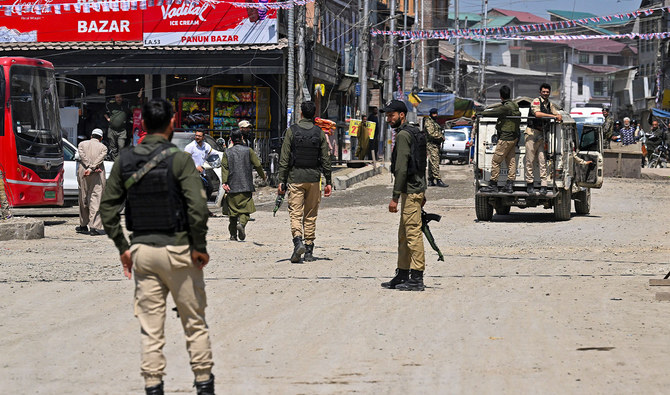
- Firefight between suspected rebels, soldiers takes place amid national elections in disputed territory
- Divided between nuclear-armed India and Pakistan since 1947, Kashir is claimed by both countries in full
SRINAGAR, India: Two suspected rebels were killed in Indian-administered Kashmir during a firefight with soldiers, police said Tuesday, at a time when campaigning for national elections is underway in the disputed territory.
Scores of soldiers besieged a residential area in southern Kulgam district, some 70 kilometers (43 miles) from Kashmir’s biggest city Srinagar, on Monday after armed militants were suspected to be present inside a house.
Two bodies of the suspected rebels “were recovered so far” from the site, police said in a statement posted Tuesday on social media platform X.
Images from the area showed smoke billowing from a house after it caught fire during the skirmish.
Kashmir has been divided between India and Pakistan since their independence in 1947, with both claiming the Himalayan territory in full.
Rebel groups opposed to Indian rule have for decades waged an insurgency in Indian-controlled Kashmir, demanding either independence or a merger with Pakistan.
The conflict has left tens of thousands of civilians, soldiers and militants dead.
Violence and anti-India protests have drastically reduced since 2019, when Prime Minister Narendra Modi’s government canceled the Muslim majority region’s limited autonomy.
But clashes between security forces and rebel groups have increased since voting began last month in India’s six-week election.
Three suspected rebels were killed and a police officer and three soldiers wounded in three separate clashes across the territory in April.
Militants ambushed a military convoy in Kashmir’s south on Sunday, killing one Indian air force corporal and wounding four other troops.


